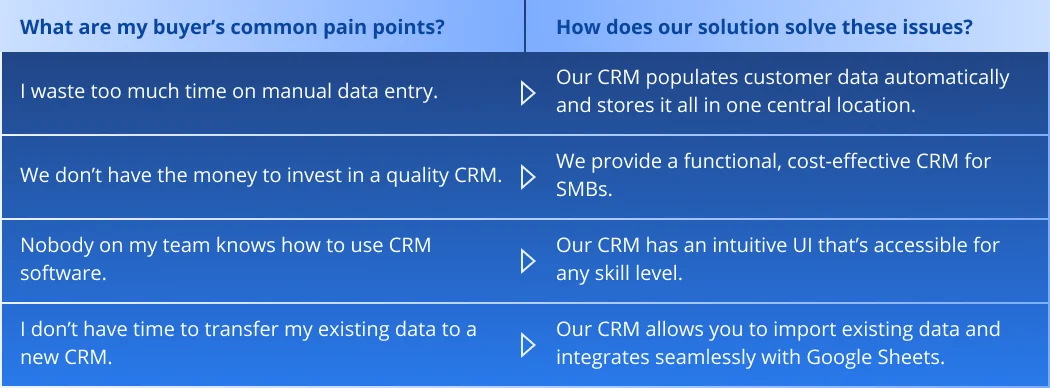How to Do a Market Analysis [in 7 Easy Steps]


Brent Walrath
This post was originally published in May 2019 and has been updated for accuracy and comprehensiveness.
In the last chapter, we discussed how to create buyer personas out of your customer data. By learning how to do a market analysis, we can step back and look at your target market as a whole.
In this chapter, we go over:
- Why create a market analysis?
- How to perform a market analysis in 7 Steps

B2B Marketing Strategy Framework: The Ultimate Guide to Business Branding
Learn how to build a strong brand experience with our downloadable guide.
Why create a market analysis?
A market analysis allows you to assess your target market and identify what your marketing messaging should address.
Unlike buyer personas, market analysis identifies key patterns and similarities within your buyers and prospect pool. Based on these call-outs, you can inform your sales and marketing messaging.
How to perform a market analysis in 7 steps
Keep in mind that performing a market analysis should not be a one-time process. Every time you launch a new product, test a new market, or even make drastic changes in your sales and marketing strategy, you should perform a market analysis.
The seven steps to performing a market analysis are:
- Determine why you’re conducting a market analysis
- Analyze your top competitors
- Evaluate your current customers
- Understand your prospects’ market conditions
- Interpret your data
- Assess your marketing material
- Optimize often
Step 1: Determine why you’re conducting a market analysis
As mentioned earlier, analyzing a market should be a continuous process — not just a one-time process in the early stages of your startup.
Ask yourself: “What does my marketing team want to know from this market analysis?” Some common questions include:
- Who is typically the decision maker for this solution?
- What will it cost for the customer to implement your solution?
- (If applicable) What have we learned from the last market analysis that we should keep in mind moving forward?
- In order to produce more effective marketing campaigns, what are some key contexts our marketing team needs to understand?
Step 2: Analyze your top competitors
When performing a market analysis, it’s important to keep tabs on your top competitors.
We recommend downloading a few of their marketing assets from different stages of the sales funnel. That way, you get a 360˚ view of how they market their solution to your shared prospects.
During your investigation, ask yourself:
- What pain points are they speaking to?
- How do they keep their messaging focused yet applicable to the general target audience?
- What are some lead form questions they asked?
EBQ Hint: You can run your competitors’ domains through SEO tools — like Semrush. Typically, these tools can identify keywords and make educated guesses on who they are targeting.
Step 3: Evaluate your current customers
You should have evaluated your current customers when you researched your buyer personas.
Using these conclusions, start identifying compelling trends and patterns.
For example:
- Why are your current customers drawn to you?
- What made them stay loyal to your brand?
- Why did your past customers end the relationship?

Subscribe to EBQ's Bimonthly Newsletter

Subscribe to EBQ's Bimonthly Newsletter
Step 4: Understand your prospects’ market conditions
Sometimes, your prospects want to convert but can’t immediately. You need to get a full picture of what external factors are preventing your prospects from converting.
Some common market conditions include:
- Economic
How has the current economic situation impacted your prospects - Political
How will current and pending legislation bills affect your prospects - Sales Cycle
How long is their sales cycle and how many people are on their purchasing committee
In our experience, speaking directly to these conditions in your marketing material demonstrates your expertise — thus building trust and credibility within your industry.
Step 5: Interpret your data
Based on your findings so far, you can draw actionable conclusions and summarize your findings.
We recommend looking at both quantitative and qualitative data for the best market overview.
- Quantitative: The numerical patterns you can draw (e.g. total market size, average customer lifetime value, total market share)
- Qualitative: Any thematic conclusions you can draw that give you a deeper understanding of your current market
Example: Let’s say you’re launching a CRM for small and medium businesses.
For qualitative data, what are some of the most common pain points within your current customer base?
Once you have gathered those points, start listing how your solution can solve these issues.

Step 6: Assess your marketing material
Take stock of your current marketing material and ask yourself: “Does this accurately reflect my findings from the most recent market analysis?”
If not, you need to brainstorm ways to better your marketing assets. For example, you can:
- Update your service page to directly call out pain points
- Ask more relevant questions in your lead forms to weed unqualified people out
- Segment your audience and creating personalized email drip campaigns
Step 7: Optimize often
As mentioned earlier, it is important to continually do a market analysis and find optimization opportunities. After all, change is the most predictable aspect of any industry landscape.
Without consistent optimization, you risk falling behind your competitors — thus decreasing your perceived relevance and trustworthiness.

B2B Marketing Strategy Framework: The Ultimate Guide to Business Branding
Learn how to build a strong brand experience with our downloadable guide.
TLDR; How to conduct a market analysis
The seven steps to conducting a market analysis are:
- Determine why you’re conducting a market analysis
- Analyze your top competitors
- Evaluate your current customers
- Understand your prospects’ market conditions
- Interpret your data
- Assess your marketing material
- Optimize often
We’ve touched on the importance of continually performing market analysis throughout the entire chapter, but we understand that this is a time-consuming process.
That’s why many business leaders choose to outsource a part of their marketing team. As your internal team conducts market analysis, our team can maintain your content cadence and ensure you stay top-of-mind for your prospects. Visit our Marketing Agency page to learn more about our full-service marketing services.
